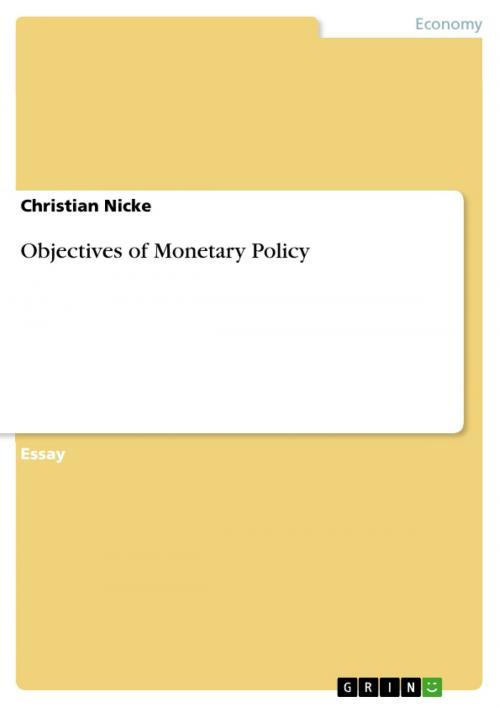Objectives of Monetary Policy
Nonfiction, Social & Cultural Studies, Political Science, Politics, Economic Policy| Author: | Christian Nicke | ISBN: | 9783638870597 |
| Publisher: | GRIN Publishing | Publication: | December 4, 2007 |
| Imprint: | GRIN Publishing | Language: | English |
| Author: | Christian Nicke |
| ISBN: | 9783638870597 |
| Publisher: | GRIN Publishing |
| Publication: | December 4, 2007 |
| Imprint: | GRIN Publishing |
| Language: | English |
Essay from the year 2007 in the subject Business economics - Economic Policy, grade: 4,0 (gut), University of Pécs (Faculty of Business and Economics), course: Corporate Finance, 26 entries in the bibliography, language: English, abstract: Two fields of policy have a strong impact on a national economy and its development. The first of the two policies that are designed to supplement each other, falls into governments responsibility, more exactly it is formulated by the minister of finance. This one is fiscal policy. The second one, monetary policy, is designed by the national bank. For making clear the difference between both I would like to explain both policies as an introduction to the topic of this paper. 'The government's choice of tax and spending programs, which influences the amount and maturity of government debt as well as the level, composition, and distribution of national output and income. Many summary indicators of fiscal policy exist. Some, such as the budget surplus or deficit, are narrowly budgetary. Others attempt to reflect aspects of how fiscal policy affects the economy. For example, a decrease in the standarized-budget surplus (or increase in the standarized-budget deficit) measures the short-term stimulus of demand that results from higher spending or lower taxes. The fiscal gap measures whether current fiscal policy implies a budget that is close enough to balance to be sustainable over the long term. The fiscal gap represents the amount by which taxes would have to be raised, or spending cut, to keep the ratio of debt to GDP from rising forever. Other important measures of fiscal policy include the ratios of total taxes and total spending to GDP.' In the way of deciding about the amount of expenditures and premises for spending, fiscal policy is an important tool for government for setting macroeconomic conditions.
Essay from the year 2007 in the subject Business economics - Economic Policy, grade: 4,0 (gut), University of Pécs (Faculty of Business and Economics), course: Corporate Finance, 26 entries in the bibliography, language: English, abstract: Two fields of policy have a strong impact on a national economy and its development. The first of the two policies that are designed to supplement each other, falls into governments responsibility, more exactly it is formulated by the minister of finance. This one is fiscal policy. The second one, monetary policy, is designed by the national bank. For making clear the difference between both I would like to explain both policies as an introduction to the topic of this paper. 'The government's choice of tax and spending programs, which influences the amount and maturity of government debt as well as the level, composition, and distribution of national output and income. Many summary indicators of fiscal policy exist. Some, such as the budget surplus or deficit, are narrowly budgetary. Others attempt to reflect aspects of how fiscal policy affects the economy. For example, a decrease in the standarized-budget surplus (or increase in the standarized-budget deficit) measures the short-term stimulus of demand that results from higher spending or lower taxes. The fiscal gap measures whether current fiscal policy implies a budget that is close enough to balance to be sustainable over the long term. The fiscal gap represents the amount by which taxes would have to be raised, or spending cut, to keep the ratio of debt to GDP from rising forever. Other important measures of fiscal policy include the ratios of total taxes and total spending to GDP.' In the way of deciding about the amount of expenditures and premises for spending, fiscal policy is an important tool for government for setting macroeconomic conditions.















